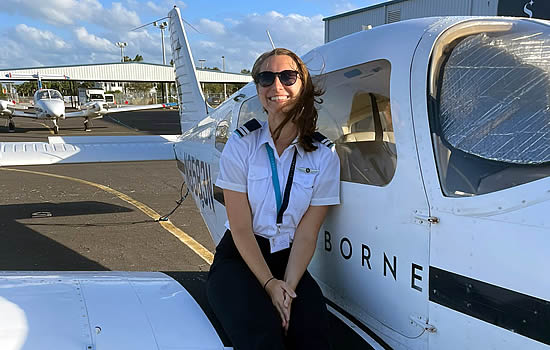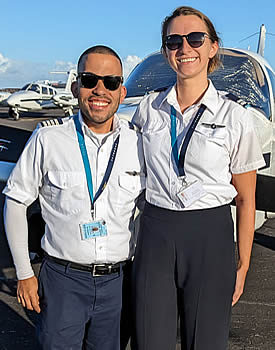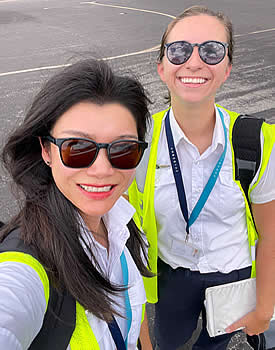
In the second of The Emerald Network’s driving a sustainable workforce initiative, Samantha (Sam) Tunnard, commercial pilot in training at Skyborne Airline Academy with bases in Gloucestershire, UK and Vero Beach, Florida, interviews her two flying instructors - Steven Lopez and Olivia Wu.

Sam has been training for her Integrated ATPL at Skyborne since Sept 2022 and has spent the past six months at Vero Beach, undergoing practical flying training. The 18-month course enables her to progress from ab initio to fully qualified commercial pilot and gain a BSc Hons degree from the University of West London simultaneously.
Sam started her flying training on Cessna 152s, progressing on to Piper Warriors and then the more complex Piper Arrow for her Commercial Pilot’s Licence (CPL). She enjoyed the Arrow’s stability and liked that Vero Beach is home to its manufacturer. Next, she’d like to fly one of the new electric aircraft such as the Pipistrel Velis to see how it compares.
Reflecting on the differences between learning to fly in the UK versus the US, Sam says she has experienced the best of both worlds: UK airspace, which is definitely more congested with class B and class D airspace, enhances situational awareness and offers a good learning environment for the instrument rating. Both locations offer great facilities, lunch spots and friendly FBOs which are all important for young student pilots. While the UK is dominated by low clouds and persistent rain, Florida’s clear blue skies allow more accessibility to flying and the opportunity to build flying hours. The combination of early flying training in Florida followed by training for the instrument rating in the UK, offers the perfect combination for student pilots, she says.
In the past month, Sam has successfully completed her CPL. On completion of the course in the new year, she is looking forward to joining a UK-based airline.
 Steven Lopez, Flight Instructor, Skyborne Airline Academy
Steven Lopez, Flight Instructor, Skyborne Airline Academy
How long have you been flying and how did you get into aviation?
I’ve been flying since 2018. I’ve dreamt of being a pilot since childhood but didn’t pursue it. Funnily enough, it was only when my younger brother qualified at our local airport in Melbourne, Florida that I decided to take the plunge and haven’t looked back.
Where did you learn to fly?
I learned to fly at Flight Safety Academy, Vero Beach which is now known as Skyborne Airline Academy. The weather is so kind for pilot training and there are plenty of qualified instructors and aircraft. I began my flying on a Piper Warrior. I acquired my commercial single engine license flying the Piper Arrow, followed by the multi-engine on the Piper Seminole. The Cessna Skyhawk 172 became my trusted companion for building flight hours and lastly, I obtained my spinning flight activity endorsement in the Marchetti SF 260.
What do you most enjoy about being an instructor and working for the school?
I thoroughly enjoy mentoring and providing guidance and support to students as they aspire to fulfil their dream of becoming a pilot. It is so pleasing that the UK airlines – easyJet, TUI, British Airways are opening up cadet programmes again. In the US, American Airlines offers a cadet programme and Delta offers its Propel Flight Academy. During the Pandemic many airline pilots took early retirement and there is a big demand for young pilots. In the business aviation sector interesting initiatives such as the one from Voluxis and its pilot academy programme is appealing.
With the advent of new electric training aircraft coming into fashion what do you think of next gen aircraft for training/low-cost option?
I am excited by new technology for training, it’s the future and we must embrace it as long as it’s safe and reliable. What is most important is the need to keep small airfields open. They train the future airliner pilots of tomorrow and the next gen electric ones too. I admire what SaxonAir in Norwich, UK are doing training pilots on the electric Pipistrel Velis. Large training companies like CAE are working closely with the eVTOL OEMs too. Once this sector of flight is embraced and certificated there will be even more opportunities for young people. It’s an exciting time to be involved in aviation.
What are your long-term ambitions?
My aspiration is to become an airline pilot based in Florida allowing me the opportunity to explore the world, immerse myself in diverse cultures, and capture every significant moment through photography which is my other passion.
If you were to fly for an airline - who would it be and what is your favourite aircraft type?
I would like to fly for a Florida-based airline, perhaps Spirit Airlines. The Airbus A320 family is my ideal. The A321XLR is a real game changer opening up the short haul market to eight hour plus routes.
Are you encouraged to see more women learning to fly - what’s been your experience with hiring prospects of minority groups in aviation?
I strongly believe in equality, and it brings me joy to see an increasing number of female students pursuing their dream of becoming pilots. My experiences with all female students have been super positive. Their dedication, and commitment to learning has been inspiring and also indicative of the tremendous potential that exists within every individual, regardless of gender.
One bit of advice to an ab initio pilot - can be three if you like?
Never give up on your dreams, regardless of how long the journey may take. Aviation is a challenging path and there will likely be ups and downs as you go through training and job hunting but it is well worth it as the rewards it offers are truly fulfilling.
 Olivia Wu, Flight Instructor, Skyborne Airline Academy
Olivia Wu, Flight Instructor, Skyborne Airline Academy
How long have you been flying and how did you get into aviation and flying?
I started learning to fly around the end of 2016 at the Florida Institute of Technology in Melbourne, FL. it was just a hobby for me back then. I wanted to get my PPL and then even look at getting my own plane. It wasn’t originally part of my career plan but I got the flying bug and here I am eager to progress with an airline.
What do you most enjoy about being an instructor and working for the school?
It’s always rewarding (and fun) to fly with students. I enjoy working through all the challenges with them, seeing them progress and I absolutely love hearing their stories…and it is so satisfying seeing them reach their goals.
With the advent of new electric training aircraft coming into fashion what do you think of next gen aircraft for training/low-cost option?
I think it is hugely exciting and I can’t wait to try flying some of the new next gen aircraft if I get the opportunity. I especially admire the Eviation Alice as it was the first all-electric passenger airplane to fly.
What are your long-term ambitions?
I am looking forward to starting hopefully with a legacy airline as a First Officer, moving up to the left-hand seat when I’ve built up 3000 hours. I’m also looking forward to constantly learning and challenging myself, working as part of team and travelling the world.
If you were to fly for an airline, who would it be and what is your favourite aircraft type?
My dream would be the A380 - all that technology in a large aircraft. Singapore Airlines would be a dream.
Are you encouraged to see more women learning to fly - what’s been your experience with hiring prospects of minority groups in aviation?
I am and it’s great but it’s hard too, especially for women because there are a lack of female role models. I would love to see many more female pilots in the aviation industry to help address the gender imbalance of just 5% of women pilots globally.
One bit of advice to an ab initio pilot?
Firstly, listen carefully to what your instructor tells you to do. Secondly, work hard. Lastly, persevere. Then you’ll be a great pilot.

BlueSky Business Aviation News | 11th January 2024 | Issue #730




